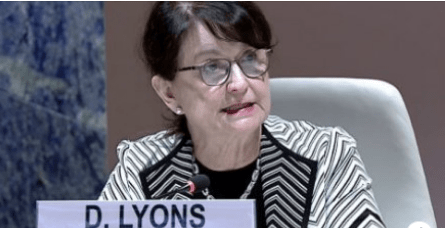KABUL (Pajhwok): Future progress in intra-Afghan peace talks is jeopardised by a relentless surge in violence, warns the top UN diplomat in the country.
Urgent global attention was needed to stem the militant-linked violence, stressed Deborah Lyons, the UN secretary-general’s special representative for Afghanistan.
“I ask all countries to continue to pressure the parties to the conflict to bring about a sustained reduction in violence and expect that this will be a top priority in the negotiations,” Lyons told a virtual meeting of the UN Security Council on the situation in Afghanistan.
Also the head of the UN Assistance Mission in Afghanistan (UNAMA), Lyons thanked Qatar for hosting the peace talks and the United States and the host country support group — Germany, Indonesia, Norway and Uzbekistan — for their diplomatic efforts.
Before agreeing on a 22-day recess in the negotiations earlier in the week, the parties agreed to rules and procedures for the dialogue, formed a working committee to discuss the agenda and presented initial topics for discussion.
In a statement from UNAMA, she said: “These developments are an early but positive sign that both sides are willing and able to compromise when needed.
The diplomat hoped the break would allow both sides to consult internally and externally and to resume negotiating with renewed commitment on January 5.
She reported violence had shot up in the country, which was rocked in the last few months by improvised explosive devices that caused over 60 percent more civilian casualties.
In addition, the ongoing security transition and the emerging reality of international troop withdrawals, have added to the deep anxieties felt by the population.
Any sustainable peace would need to be owned by Afghanistan’s diverse society, she said, believing that achieving it would be possible only if security concerns were addressed.
She emphasised on the inclusivity of the process, with meaningful participation by women, youth, minorities, war victims and religious leaders.
The UNAMA head hailed the recent formation of the High Council for National Reconciliation in that light. The Taliban, too, must expand their consultations with Afghan constituencies, she said.
“Regional cooperation will also be essential as peace unfolds, including in the areas of trade, connectivity and counter-narcotics efforts,” the UN envoy explained.
She noted a strong commitment among regional partners to such cooperation in recent visits and talks. UNAMA convened three high-level meetings in Geneva on regional cooperation the peace-security-development-humanitarian nexus, and the role of the Afghan private sector in peace and self-reliance.
Donors had made clear their assistance came with expectations of tangible improvements on peace, governance, rule of law, anti-corruption and human rights and protection of civilians, civil society leaders and media workers, she continued.
With the country facing a new wave of COVID-19, she encouraged the international community to continue their generous assistance for dealing with the pandemic.
Views: 11









GET IN TOUCH
NEWSLETTER
SUGGEST A STORY
PAJHWOK MOBILE APP